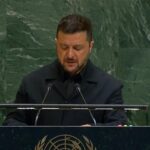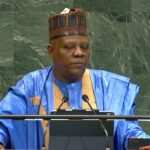The administration of United States President Donald Trump has banned Iranian diplomats from shopping in the country.
The restriction affects Iranian diplomats and officials who are currently in the U.S. for the United Nations General Assembly (UNGA).
According to a directive issued by the U.S. government, Iranian diplomats will be required to seek approval from the State Department before embarking on any shopping spree.
The new rules banning Iranian diplomats from shopping also extend to their families. This means Iranian officials would not be able to access stores such as Costco, Sam’s Club, or BJ’s Wholesale Club.
The restrictions also extend to luxury items valued over $1,000, including jewelry, perfumes, handbags, and vehicles exceeding $60,000, requiring explicit U.S. permission for all such acquisitions.
“We will not allow the Iranian regime to allow its clerical elites to have a shopping spree in New York while the Iranian people endure poverty, crumbling infrastructure, and dire shortages of water and electricity,” the U.S. State Department said in a statement.
“By preventing Iranian regime officials from exploiting diplomatic travel to the UN as a means to obtain goods unavailable to the Iranian public, we are sending a clear message: When the United States says it stands with the people of Iran, we mean it.”
However, Iran’s Foreign Ministry has criticised the government of the U.S. for banning Iranian diplomats from shopping.
Iranian officials lashed out at the restrictions, saying that they were inappropriate for the nation that hosts the U.N. General Assembly.
A spokesman for Iran’s Foreign Ministry, Esmail Baghaei, said that the measures contravened the United States’ obligations as the host country of the U.N. headquarters.
“The real objective behind the increasing restrictions imposed by the US administration on Iranian diplomats and their dependents in New York is to disrupt Iran’s diplomatic performance within the United Nations. The U.S. systematic harassment of Iranian diplomats has obstructed the Iranian delegates from attending several multilateral events that were held outside the so-called ‘permitted parameters’ during this week only.
“Applying such cheap restrictions on our diplomats’ movements and even on their daily grocery shopping is not only a blatant violation of the US obligations under the Headquarters Agreement but also a new low in terms of showcasing the extent of animosity of the US administration toward Iranians,” Mr. Baghaei said on Wednesday.
Speaking on the development, Omid Memarian, an expert on Iran at DAWN, a Washington-based research group that focuses on the Middle East said: “These measures are aimed at exploiting sensitivities in Iranian public opinion.
“For years, many Iranians have been dissatisfied — and even angry — that large delegations travel with presidents to New York, imposing significant costs on the nation in the midst of sanctions and economic austerity.”
Pan-Atlantic Kompass reports that the U.S State Department has been using travel restrictions to curtail the movements of foreign diplomats over the years.
Those rules frequently come under scrutiny during the General Assembly, when hundreds of visiting officials — including those from nations with fractious relationships with the United States — descend on New York for several weeks.
Iranian diplomats have often faced some of the most stringent restrictions and were commonly confined to a 40-kilometer radius of Manhattan’s Columbus Circle. In 2019, the Trump administration tightened those rules, forbidding visiting Iranian diplomats and their families from traveling beyond Kennedy International Airport, the Iranian ambassador’s residence in New York, the Iranian mission to the United Nations, or a small radius around the U.N. complex on Manhattan’s East Side.
Mohammad Javad Zarif, then the Iranian foreign minister, was forbidden from traveling to Memorial Sloan Kettering Cancer Center, 20 blocks north of the United Nations, where the sitting ambassador was undergoing treatment.





